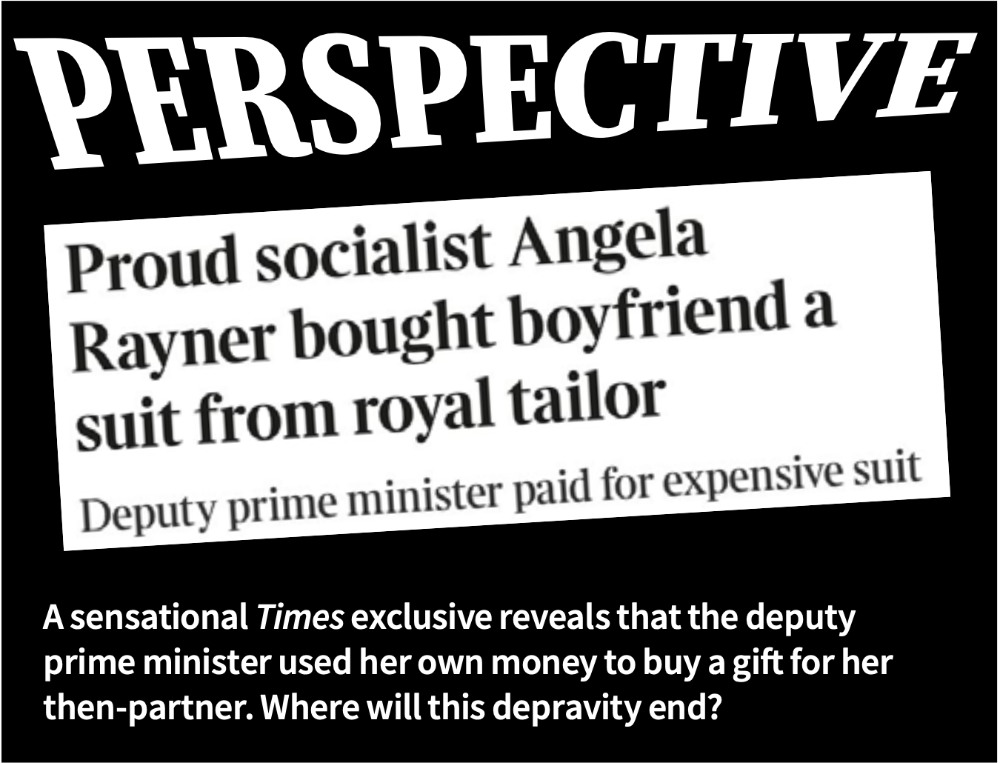Re: “Maga, the cult that won’t die” by Matthew d’Ancona (TNE #407). My wife and I are US citizens and have lived in the UK for 12 years. When I first arrived, I spoke proudly of how the US had elected Obama.
However, we were dismayed when Trump won in 2016. We were further dismayed at the (lack of) reaction to the events of January 6, 2020. And we are appalled that more than 100 million Americans seem to think that Trump would again make a great president.
In the country in which we grew up, it was the leaders of the Republican Party who convinced Nixon to resign. And what do the leaders of the Republican Party do now? Kick out any who want to return the party to its historical beliefs (see the Cheneys and the Romneys)
Neither of us voted for Reagan, but at least he had a vision which looked to improve the country and its society and which preserved the historical continuity of the country. Such a vision is no longer on offer.
Early in September, just over a month ago, we attended our UK citizenship ceremony and last week received our UK passports. We can no longer physically return to the “land of our birth”, because while we may visit, that “land” no longer exists except in our memories.
Terry Layman
Chaddleworth, Newbury
The light at the end of the tunnel is that Maga’s appeal is to the old and the white. A dwindling demographic. Not so much a new wave of populism but an atavistic response to America’s election of a black president in 2008.
Who are these Maga cult devotees? The children of people we’ve all seen in photographs, jeering as black pupils entered newly desegregated schools and the grandchildren of people happily grinning for the camera on lynching photographs.
Peter Robb
You normally produce a paper to very high standards, so I was disappointed to see a silly misprint in TNE #407, where you accompanied a picture of Donald Trump with the caption “The cult that won’t die.”
Joe McLaughlin
Bonnyrigg, Midlothian

Out of tune
Re: “Downwardly mobile” by Ros Taylor (TNE #407). My wife and I recently had a four-day break in Bristol, during which we went to the TV recording in the Bristol Beacon of the final of the BBC Young Musician of the Year competition.
The three finalists were a 16-year-old Chinese pianist currently studying piano and composition at the Royal College of Music, a 17-year-old violinist from Kyiv studying at the Purcell School in Bushey and a 17-year-old pianist from Vancouver studying with Gareth Owen, head of Piano at Eton College and a professor at Junior Guildhall. As you can see, three young musicians from contrasting backgrounds, all resident in the UK because of the quality of the music education available here.
The elephant in the room is that neither these three nor the hundreds of talented young musicians who entered the competition but didn’t get to the final will have the freedom to travel to Europe that their equivalents had before the folly of Brexit. One of those former winners, the jazz trumpeter Laura Jurd, whom I’ve known since she was 14, performed all over Europe before Brexit, but has much more limited opportunities to do that now.
The UK government should wield this cultural capital that Britain so conspicuously has to make it easier for musicians, not only soloists, but ensembles both instrumental and vocal, not only classical but also jazz, to access performance opportunities in Europe. There are parallels, obviously, with the Erasmus scheme.
Tim Fell
The reality of youth mobility might well be less controversial than in theory, but this is a government which struggles to explain sensible decisions. Take the winter fuel allowance, where it left the claim from the left wing Unite union that it was “picking the pockets of pensioners while not taxing the rich” unchallenged. A simple answer would have been “some pensioners ARE the rich”, but this was beyond ministers.
Rachel Reeves has promised difficult decisions, but don’t expect too many brave ones such as youth mobility.
Martin Harrison
Low expectations
James Ball is absolutely correct in “The case for audacity” (TNE #407). Keir Starmer lacks political courage and conviction. He should be negotiating for a customs union that would bring in the revenue that the government desperately needs.
Furthermore, the Bank of England should buy bonds by quantitative easing, which would have the effect of reducing interest rates and enabling more government borrowing.
To be really bold, Starmer should hold another referendum to assess whether the British people would like to apply to rejoin the European Union.
David Hogg
North Somerset
I had great hopes for Starmer’s administration to be cleaner than clean. While they’re not as bad as the previous lot (hard to beat), Labour and individual politicians do receive donations and “favours” from lobbyists and businesses. These don’t dish out cash from of pure benevolence. Their CFOs would have something to say about that.
Running a political party costs money. Competing for an election, even more. And the more money you spend on advisers, media experts, etc, the more you are likely to perform at the ballot box. But of course, the more money people give you, the more influence they gain over you.
A 2011 report by the Committee on Standards in Public Life recommended a cap of £10,000 with additional state funding. What a simple solution to this ongoing corruption! Less money needed = less donors = fewer opportunities for donors to get something back.
How come this cap has not been effected? It can’t be because it would affect the advisers/lobbyists/donors’ opportunities to impact how the country is run… right?
Jean-Marie Orhan
Ipswich, Suffolk
Brexit is like one of those maths problems where water pours into a tank but simultaneously flows out of it through an open tap. It does not matter how much Labour pours into the economy or how many initiatives they take – unless the tap is turned off by rejoining the EU, our economy will continue to decline and Labour will struggle to maintain our current dismal position, let alone improve on it.
For a post-colonial, post-industrial European nation like Britain, there is no alternative to the EU. We are too small to be the US and too big to be Singapore. No other European nation of comparable size and level of economic development is attempting to go it alone and with good reason: they understand that without the EU they have no future.
Unless Labour can swallow that unpalatable truth and then persuade the public that rejoining is the only credible option, its time in office will be nothing but an exercise in futility.
Mark Grahame
As a pensioner, I agree with Ann Harries (Letters, TNE #407) that the government has done the right thing in means-testing winter fuel allowance.
However, there is a cohort of pensioners who throughout their lives, were home carers or did the low-paid but essential jobs that never allowed them to save or build private pensions. Still less buy a house or take part in the council house sales bonanza, the proceeds of which are now trickling down to other pensioners.
Those low-income pensioners should be looked after and state pension arrangements boosted significantly to ensure that they are but in a targeted way. However, we cannot carry on paying taxpayer-funded benefits to people who don’t really need them.
Bob Hale
Portishead, Bristol
Waiting for my Covid booster jab, I overheard someone say he had come across a 78-year-old couple crying in the street because they had lost their £600 winter fuel allowance and didn’t know how they would survive the winter. He thought this “a disgrace”.
I am 78 and living with my pensioner wife but we will not lose £600, we will lose £200. The winter fuel allowance is calculated per household and paid individually. Last year our household allowance was £200, which was split in two and £100 paid to each of us.
I didn’t doubt his story but when I told him that based on my experience they would lose £200 not £600, it was clear he preferred to believe they had lost £600, so I let it go.
The winter fuel allowance – when it was introduced in 1997 – was £200 per household until 2003/04, when an additional £100 per household was paid to those households with someone aged over 80, meaning that a household received either £200 or £300 per household.
There is a widely held misconception that each pensioner was receiving £300. It’s no wonder when you hear £300 on the news without any explanation about it being per household and age-related. And let’s be honest, it was a great opportunity for the Tory press to shoot into an open goal.
But Labour are equally responsible for this misconception by withdrawing the allowance without adequate explanation demonstrating a lack of concern for public perception, just as did their taking all those freebies. Did they not hesitate for a moment and ask themselves: “What will people say?” Apparently not.
John Simpson
Ross on Wye, Herefordshire
World of sport
What a story “A race for Europe” (TNE #406) was! Even as a runner, I wasn’t aware of the race between Vladimir Kuts and Chris Chataway.
It’s surprising how much exposure we in the UK had to Eastern bloc sport between 1945 and the mid-to-late-1950s when one considers how we are often told about “the secret Iron Curtain” – Chelsea v Dinamo Moscow, Wolves v Honved, England v Hungary and grandstand events like this race.
Em Jackson
Hope never fades
How pleasing to read Charlie Connelly’s excellent “Homage to Ruritania” (TNE #406) about the famous late Victorian novel The Prisoner of Zenda and its less famous author, Anthony Hope.
Charlie Connelly mentions that Hope’s father was the vicar of St Bride’s, Fleet Street. This was a post he took on in late middle-age after a career as a schoolmaster, first at Brighton College and then as headmaster of St John’s School, Leatherhead, where he was a distinguished and reforming head who turned a modest charitable institution into a significant public school.
Anthony Hope was knighted in 1918, but not for any literary distinction. He was rewarded for his important work with the Ministry of Information during the first world war, where he helped to build up the idea of a “noble cause” for entry into the war, namely the defence of “brave little Belgium” which had been invaded by Germany.
Despite his association with Ruritania and tales of romance and danger, when Anthony Hope died he was buried, as requested, alongside his parents in the churchyard of the parish church in Leatherhead, Surrey.
Richard Hughes
What a delightful article by Charlie Connelly about autumn poems (TNE #405). His own description of dawn in Scotland was lovely, too.
Dorothy Woolley
Newark on Trent, Nottinghamshire

BELOW THE LINE
Comments, conversation and correspondence from our online subscribers
In his piece on Michael Gove (TNE #407), Mic Wright writes of Charles Moore: “His previous hits in the magazine include using his column to wonder if gay marriage would result in a law “[allowing] one to marry one’s dog.”
Marry one’s dog? My husband’s late cousin would have gone for that. Her Bedlington terrier Hugo really was her best friend. Human beings were a long way behind.
Janet Berridge
“Spain’s invasion of the jellyfish” (Carousel, TNE #407) reminds me of when I last visited one of the Balearic islands with some friends. There was one afternoon where I emerged from the waters practically begging one of my mates to relieve himself on my leg.
Iain Thompson
Re: “Do widzenia to Daquise?” (TNE #407). This is my favourite restaurant in London, and has been for years. Perfectly positioned relative to a visit to Exhibition Alley.
John Tanzer
It was interesting to read in “Can Scotland save the Commonwealth Games?” (TNE #407) about the buzz that this prospect is giving Scottish athletes – one of the few opportunities they get to represent the country rather than as Team GB. Perhaps a cut-down version, as the next Glasgow games are likely to be, is the model for the future.
Brian Menzies
Re: Dilettante’s rage against the machines (TNE #407). I’m not even sure what the point of AI is. But I can take a guess at who it’ll benefit.
Remember when we thought that computers would lead to a big increase in both leisure time and prosperity? But in practice, working people work harder than ever, only their bosses benefited.
The same promises were held out for the Industrial Revolution – and for all I know, the invention of the wheel.
Tony Jones
Really enjoyed “Visiting a country that doesn’t exist” (Carousel, TNE #406). Carousel is one of my favourite parts of the paper. Transnistria remains an enigma, but the mystery of it becomes clearer after this piece by Dariusz Dankowski. More like this please.
Denny Ford
JOIN THE CONVERSATION
Subscribe and download our free new app to comment and chat with our writers



